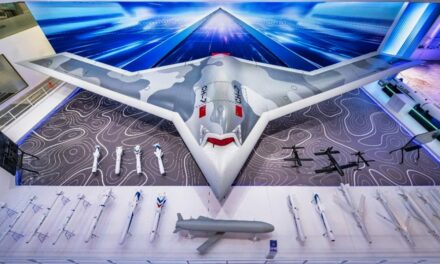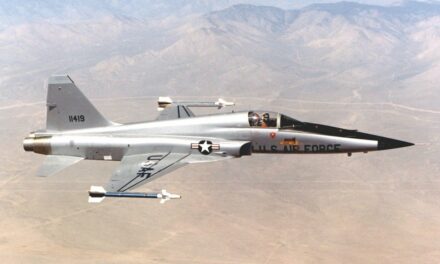We support our Publishers and Content Creators. You can view this story on their website by CLICKING HERE.
Will the Islamic State (ISIS) Re-Constitute? And Where?: Get ready for the resurgence of the Islamic State, or what many call ISIS.
The U.S.-led coalition to defeat the Islamic State did not eliminate the threat; it just contained it. More than 40,000 Islamic State veterans and their family members remain in limbo in the camp. Many lost citizenship when they volunteered to join the Islamic State. The children of Islamic State militants never had clear citizenship. For many in the West, Al-Hol has been a case of out-of-sight, out-of-mind as the news cycle has moved on. Human rights groups have impeded dissolution of the camp fearing that the Iraqi government, for example, will impose the death penalty against those who enslaved Yezidis and murdered Shi’ites and Christians.
The Islamic State Threat
The future of Al-Hol, the prison camp where Islamic State veterans and their families remain under Kurdish guard, is in perilous shape for three interlinked reasons. First, the Turkish assault on areas of Kurdish administration forces the Syrian Democratic Council guards to deploy elsewhere to protect Kurdish towns and cities from a possible Turkish invasion. Second, Turkey may again target the Kurdish prison guards, accusing them of being terrorists themselves. Finally, confirming its goal is to change the prison’s regime, Turkey has said its own Hay’at Tahrir al-Sham, a former Al Qaeda affiliate, can take over guard duty.
If ISIS members and sympathizers escape, they will go in two general directions.
Many will stay in Syria or spread across the Middle East. Some will seek reprisals against the Kurds, and Hay’at Tahrir al-Sham will likely tolerate others in order to assuage militants under their umbrella or even play good cop, bad cop by advancing the caliphate’s agenda without risking accountability for its actions. Others will head to Jordan, Saudi Arabia, and Egypt where they will join cells tom destabilize America’s top Arab allies. Still others will sell their skills as mercenaries for Islamists in Somalia, Libya, and Sudan.
Many others will flee across Turkey’s deliberately porous border. Turkish President Recep Tayyip Erdogan has made an artform out of blackmailing Europe with the threat of releasing refugees westward. He would treat the Islamic State as an opportunity, not a scourge. Not only will terror—stabbing, car ramming attacks, and bombings—become rampant across Western Europe, but some of the Islamic State veterans will find their way to America’s southern border.
Absent a willingness to arm the Kurds with surface-to-air missiles and sanction the Turkish economy into oblivion, there is little chance the West can avoid the ISIS breakout.
Ironically, the only country that could remain immune to its blowback is Iraq. It is easy to be cynical about the utility of development. US Agency for International Development spends billions of dollars often detached from broader U.S. national security goals. Often, it erodes security and stability as various regimes treat its work as a safety net to escape accountability for their own decisions.
Development, however, can matter. In the eight years since the Islamic State’s defeat, Mosul remains a shell of its former self. Successive Iraqi governments and Ninewa governors have mired reconstruction in red tape, while opportunistic officials siphon off both Iraqi and international reconstruction funds. Moslawis, never known as the most patient or generous people in Iraq, are angry and rightly so. The Islamic State victimized the city, but it may again find some fertile ground there. Lack of development in Mosul will have consequences.
Not so in Al-Anbar. Twenty years ago, for example, Iraq’s Al Anbar governorate was the epicenter of the insurgency. Fallujah and Ramadi were essentially no-go, kill zones. For the past five years, they have been among Iraq, safest, most vibrant cities rivaling and even surpassing Iraqi Kurdistan in development and commerce. Simply put, the region benefited from its tribal and business leaders’ decision to cease waiting for handouts and to take responsibility for their own city and region.
A U.S. Marine Corps light armored vehicle with Battalion Landing Team 1st Battalion, 6th Marine Regiment, 22nd Marine Expeditionary Unit (MEU), fires its 25 mm Bushmaster machine gun during a live-fire exercise as part of Exercise Eager Lion 2014. Eager Lion is a recurring, multinational exercise designed to strengthen military-to-military relationships, increase interoperability between partner nations and enhance regional security. The 22nd MEU is deployed with the Bataan Amphibious Ready Group as a theater reserve and crisis response force throughout U.S. Central Command and the U.S. 5th Fleet area of responsibility. (U.S. Marine Corps photo by Sgt. Austin Hazard/Released) Unit: 22nd Marine Expeditionary Unit DVIDS Tags: 22nd Marine Expeditionary Unit; 22MEU; USMC; APC; United States Marine Corps; Jordan; Amphibious Ready Group; 22d MEU; M240B machine gun; LAV; JAF; USS Bataan (LHD 5); ARG; 22nd MEU; LAR; live-fire range; light armored vehicle; light armored reconnaissance; M113 armored personnel carrier; Jordanian Armed Forces; EagerLion2014; Exercise Eager Lion 2014; 25 mm Bushmaster machine gun.
Much like the Kurds in northeastern Syria, Al Anbar’s Arabs invested their own money into projects and put their own skin into the game. A competent governor willing to scramble for investment further solidified progress. Should the Islamic State seek to entrench itself in Al-Anbar, the local community will be the first to turn on and try to uproot them.
ISIS and the Tragedy that is the Middle East
The Middle East is heading toward crisis. Within Iraq, certain regions like Al Anbar will be secure; others like Mosul less so. Diplomatic nicety will not save Jordan from the Islamic State threat after decades of royal family corruption and ineffective administration. The same is true for Egypt and Kuwait. Decades of policymakers treating Turkey as an ally regardless of its behavior and a culture within the development community to throw money at problems rather than build local accountability have combined to create a tinder box that a mass Islamic State prison escape will set on fire.
About the Author: Dr. Michael Rubin
Michael Rubin is a senior fellow at the American Enterprise Institute and director of policy analysis at the Middle East Forum. A former Pentagon official, Dr. Rubin has lived in post-revolution Iran, Yemen, and both pre- and postwar Iraq. He also spent time with the Taliban before 9/11. For more than a decade, he taught classes at sea about the Horn of Africa and Middle East conflicts, culture, and terrorism, to deployed US Navy and Marine units. Dr. Rubin is the author, coauthor, and coeditor of several books exploring diplomacy, Iranian history, Arab culture, Kurdish studies, and Shi’ite politics. The author’s views are his own.

 Conservative
Conservative  Search
Search Trending
Trending Current News
Current News 





